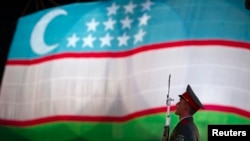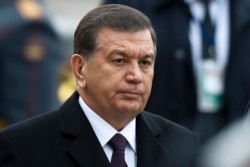The founder of a website that publishes accounts of domestic abuse survivors is refusing to comply with an order from Uzbek authorities to delete an article.
Irina Matviyenko, who runs NeMolchi (Don't Keep Silent), said the Uzbek media regulator, the Agency for Information and Mass Communications, warned on March 27 that the website was "disseminating immoral content."
Matviyenko told VOA that violence against women is a serious problem in Uzbekistan, but that some people view attempts to protect domestic abuse survivors as an attempt to break up families.
Her website, NeMolchi, publishes anonymous accounts from survivors of abuse and reports on cases, statistics and advice.
The U.N. Human Rights Committee raised concerns over protections for women and limits on press freedom in its first review of Uzbekistan since President Shavkat Mirziyoyev came to power in 2016.
The report, released Wednesday, criticized Uzbekistan's defamation laws and its jailing of journalists and bloggers on politically motivated charges such as extremism. It added that not enough protections were in place for victims of domestic violence.
In Matviyenko's case, the media regulator said an anonymous account of a woman abused as a child was published on her site in violation of Uzbek laws.
Matviyenko said agency officials told her what they were doing was a legal regulation, not censorship.
The Agency for Information and Mass Communications told VOA the website was in violation of the law on information, which bans the dissemination of pornography.
The agency oversees media in Uzbekistan, ensuring that news outlets comply with local laws.
"The agency seemed disturbed by the phrases like 'masturbating in a closet' and 'rape' that were used in the memoir," Matviyenko told VOA. "Our project does not promote immorality or pornography. Nor does it contradict the national mentality. The story is a personal recollection of a woman who was raped in childhood and who is sharing it with the public."
The Ireland-based Front Line Defenders said that the regulator claimed the story may be in violation of laws including "the protection of children from information harmful to their health," and that failure to comply with the notice would result in a case being opened against the site.
The rights group added that it believed the notice was an attempt to silence those who work on issues of gender-based violence.
The Agency for Information and Mass Communications told VOA that NeMolchi was one of 30 websites found to have gambling or pornographic content. At the time, the website was not using an 18+ mark.
Websites are given an opportunity to remove all offensive content before the regulator recommends to the prosecutor general's office that a case be opened, an agency spokesperson said.
Free expression
Steve Swerdlow, a human rights lawyer with expertise on Central Asia, told VOA he sees NeMolchi as an important test case for free expression in Uzbekistan.
"Interpretations about what language constitutes pornography is a complicated balancing act in any jurisdiction, let alone one where decades of state censorship have been the norm," Swerdlow said.
"Taboo subjects like domestic violence and rape in Uzbek society were suppressed by the state for decades, meaning that these topics were always kept in the shadows, leaving many victims without access to services and support," he added.
Uzbek authorities have a legitimate interest in curtailing the use or viewing of child pornography but, Swerdlow said, "international law places an obligation on states to uphold free expression and apply censorship in a proportionate way."
The media regulator told VOA that recommendations are based on United Nations conventions and international laws that ban child pornography.
It denied it was attempting to block critical coverage.
2018 reforms
The notice appears to contradict the media regulator's promise, as part of 2018 reforms, to defend press freedom and protect the rights of journalists and bloggers.
Since Mirziyoyev came to power, access has been restored to some previously blocked sites, including VOA Uzbek, BBC Uzbek, and Human Rights Watch. However, RFE/RL Uzbek, which focuses on issues of domestic abuse, remains blocked.
RFE/RL and VOA are independent government-funded news outlets.
However, the Sweden-based Civil Rights Defenders said rights advocates have documented several attempts to silence critical voices.
"The order completely contradicts many of President Mirziyoyev's publicly stated commitments to human rights and freedom of expression, and his intent to address women's rights violations, including gender-based violence," Muzaffar Suleymanov, Eurasia program officer at Civil Rights Defenders, told VOA.
"We do wonder if those who issued it understand that Irina exposes problems and abuses that remain unaddressed in the country, and that by gagging her they send an absolutely wrong signal to the abusers and those who expose them."
Daniel Rosenblum, U.S. ambassador to Uzbekistan, also expressed support for Matviyenko.
"It is important to let people tell their stories without censorship, even when it's uncomfortable," he posted on Twitter. "Sharing such stories helps promote President Mirziyoyev's initiative against domestic violence."
Navbahor Imamova contributed to this report.










